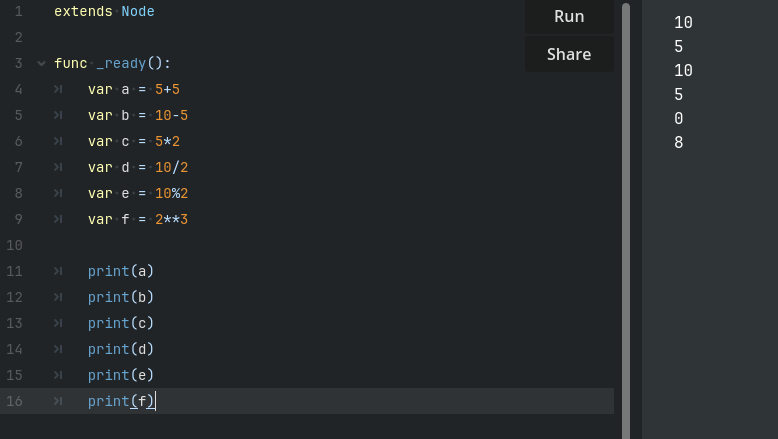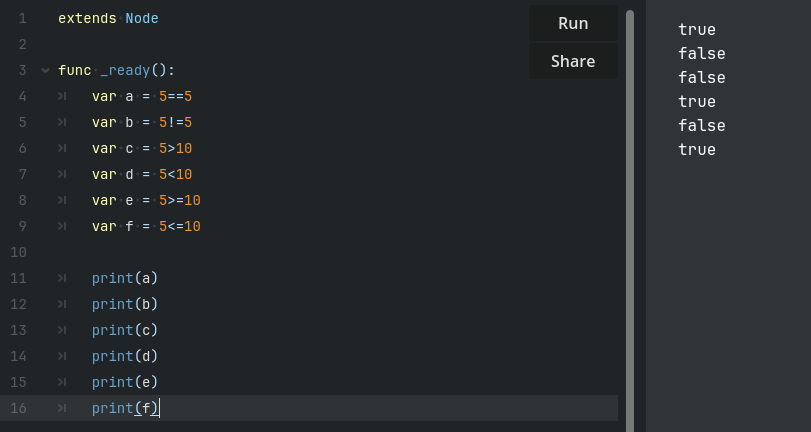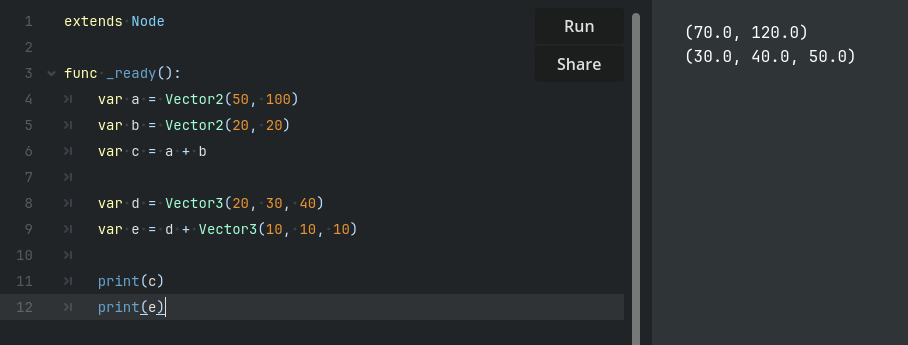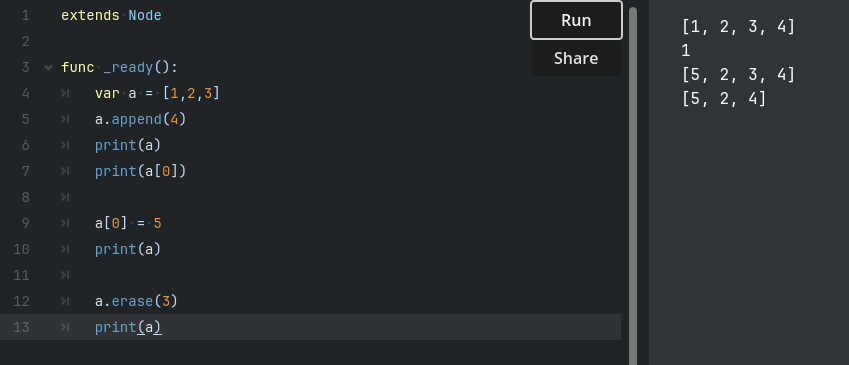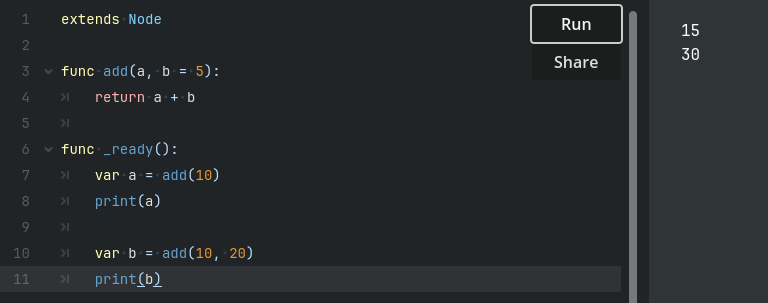GDScript is the custom programming language made for the Godot game engine. It is syntactically similar to Python, and many of the language quirks are integrated to its game engine nature.
There isn’t a single ‘main()’ entry point in GDScript. Scripts are attached to individual nodes (or scenes) in the Godot game engine, and there are three primary entry points: _ready() is a ‘setup()’ function that runs once to load and initialize variables _process() is a ‘loop()’ function that runs many times a second to handle specific game updates where applicable _physics_process() is another ‘loop()’ function that runs many times a second to handle properties specific to a physics engine, where applicable
For this tutorial, we use primarily use _ready() as our ‘main()’ equivalent. Scripts can be run in the Godot game engine itself, or this github pages link for simpler, non-integrated examples.
- Here is a link to a brief demonstration of the 'Hello World' program.
- Here is a link to a brief demonstration of a Lambda function implementation.
- Here is a link to a brief demonstration of a custom GDScript datatype.
Note that I am using an online Godot Engine found on github pages and not the explicit downloaded Godot Engine.
For simple input/output, there is the _input() function which will run whenever an input event occurs. This function is specific to the game engine, which means expected input tends to be mouse/keyboard presses and movements instead of text input.
The following is a brief snippet of the _input() function and how it can gather input and print output. Note that 'print()' is the standard output as it is in similar languages, such as Python.
- int: Represents integers (whole numbers)

- float: Represents floating-point numbers (decimal values)

- bool: Represents boolean values (
TrueorFalse)

- str: Represents strings (text data)

- null: Represents the absence of a value

GDScript is Dyanmically typed by default but can optionally be statically typed.
- var x = 5 # Dynamically Typed
- var x: int = 5 # Statically Typed
GDScript is also strongly typed, which means types must be explicitly converted.
-
Addition (
+): Adds two numbers. -
Subtraction (
-): Subtracts one number from another. -
Multiplication (
*): Multiplies two numbers. -
Division (
/): Divides one number by another. -
Modulus (
%): Returns the remainder of a division. -
Exponentiation (
**): Raises one number to the power of another.
-
Equal (
==): Checks if two values are equal. -
Not equal (
!=): Checks if two values are not equal. -
Greater than (
>): Checks if one value is greater than another. -
Less than (
<): Checks if one value is less than another. -
Greater than or equal to (
>=): Checks if one value is greater than or equal to another. -
Less than or equal to (
<=): Checks if one value is less than or equal to another.
- AND (
and): ReturnsTrueif both conditions are true. - OR (
or): ReturnsTrueif at least one condition is true. - NOT (
not): Negates the condition.
Note that there is no incremental operator in GDScript (x++, x--). Correct notation would be (x+=, x-=). This exists for all Arithmetic Operators.
Strings are immutable in GDScript. As Godot is a game engine, there is not as much emphasis on strings and string operations as there are in other popular and easy languages, like Python. There are a lot of built in methods that are helpful for converting hexcode, opening and writing to files, reading locations, and other more technical string implementations.
-
Length: "abc".length() # 3
-
Upper: "abc".to_upper() # "ABC"
-
Find: "abc".find("b") # 1
-
Substring: "abc".substr(1, 2) # "bc"
-
Capitalize: "abc".capitalize() # "Abc"
-
Contains: "abc".contains("b") # true
There are a few specific types that are specific to GDScript with a focus on the Godot game engine. Some of these types are Vector2D, Vector3D, and Color. Vectors may be used to track positions and calculate movements, while colors are used to store RGB values for any purpose.
There are two primary data structures in GDScript - Arrays and Dictionaries. The array can operate as a resizeable list and has stack/queue operations. The Dictionary is a standard key/value pair. There is also a PackedArray, which explicitly typecasts the Array in regards to storage management.
- arr.size()
- arr.push_back(5)
- arr.pop_back()
- arr[0]
- arr[0] = 100
- dict.has("key")
- dict["key"] = value
- dict.erase("key")
GDScript uses indentation to define code blocks, similar to Python. It uses Lexical and Function scoping, and variables are defined with 'var' (using indentation to determine variable visibility).
Decision making statements that may allow you to choose to execute different blocks of code.
- If Statement

- Else Statement

- Elif Statement
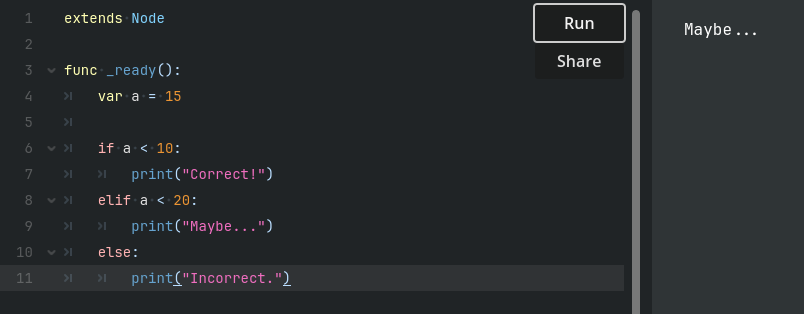
- Match Statement (Switch)
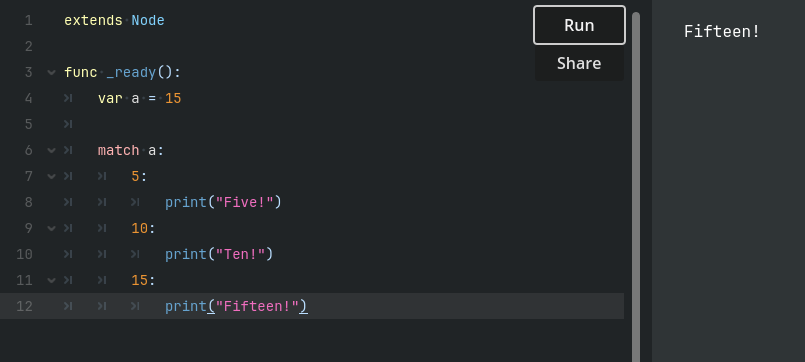
- Nested If Statement

- Ternary Operator

Loops - used to repeat blocks of code multiple times. Loop control statements 'continue', 'break', and 'return' are all supported.
Functions can be declared similarly as follows:
They can use 'return' to return values, or omit this entirely to perform a different operation. There are examples of both above. Below is an example of a function that uses a default parameter, in similar notation to Python. Note that there are no explicit '*args' or '**kwargs'. GDScript uses functions as First Class Citizens, which means they can used as arguments or have them returned from other functions. This also means it allows higher-order functions, such as the 'map' demonstrated in the Functional Features section below.
There is also the ability to create anonymous/lambda functions in GDScript. Examples of this are shown below:
Other Functional programming types are similarly implemented and mostly follow the Python structure.
The GDScript scripts themselves can act as a custom type. In the examples below, note that each script corresponds to a specific node. This means that each node acts as it's own 'class' to a certain degree, allowing the loading of other scripts to create custom objects.
Each GDScript script can act as a module. There are no explicit namespaces, but as each script is assigned to a node (ie, 'Player' node has a 'player.gd' script), scripts can be organized in an inuitive file structure (ie, characters, utils, etc.) To import, see the example in 'User Defined Types' above. 'Load', 'Preload', and 'Extends' will import another script using the correct paths.



